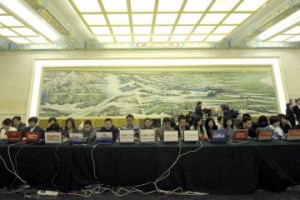A new report The Long Shadow of Chinese Censorship: How Chinese Media Restrictions Affect News Outlets around the World, by Freedom House research analyst Sarah Cook, and published by the Center for International Media Assistance, has found that over the last five years China’s media controls have begun to seriously constrain the news outlets of international organisations.
As China’s international political and economic power has grown, so has international coverage. The number of foreign correspondents in the country has nearly doubled since 2002, increasing from 353 to 682. “The Communist Party thinks it’s now powerful enough to intimidate [non-Chinese], from business people to diplomats to academics and journalists, and it’s willing to throw its weight around,” veteran China reporter Paul Mooney said. “It has learned that this often works and is willing to do anything to protect its image and stop negative news from being reported.”
The study shows that Chinese officials have directly impeded independent reporting by barring foreign correspondents from sites of important incidents or pressuring senior executives not to publish content deemed politically undesirable to the Chinese regime.
The Communist Party of China engages in various strategies for influencing international media, according to the study, including direct action by Chinese diplomats, local officials and security forces; obstructing news gathering, preventing the publication of undesirable content, and punishing overseas media outlets that fail to heed restrictions. Indirect pressure is applied via advertisers, satellite firms, and foreign governments who take action to prevent or punish the publication of content critical of Beijing. Incidents such as cyber attacks and physical assaults are not conclusively traceable to the central Chinese authorities but serve the Party’s aims.
The study found that, during the last six years, foreign journalists have been assaulted while reporting on land protests in Zhejiang and an activist’s trial in Sichaun, among other incidents.
In addition, journalists have experienced delays in visa processing or had their applications rejected directly based on the content of their reporting. In 2013, ten percent of respondents reported difficulty obtaining press accreditation because of their reporting.





 Print
Print Email
Email